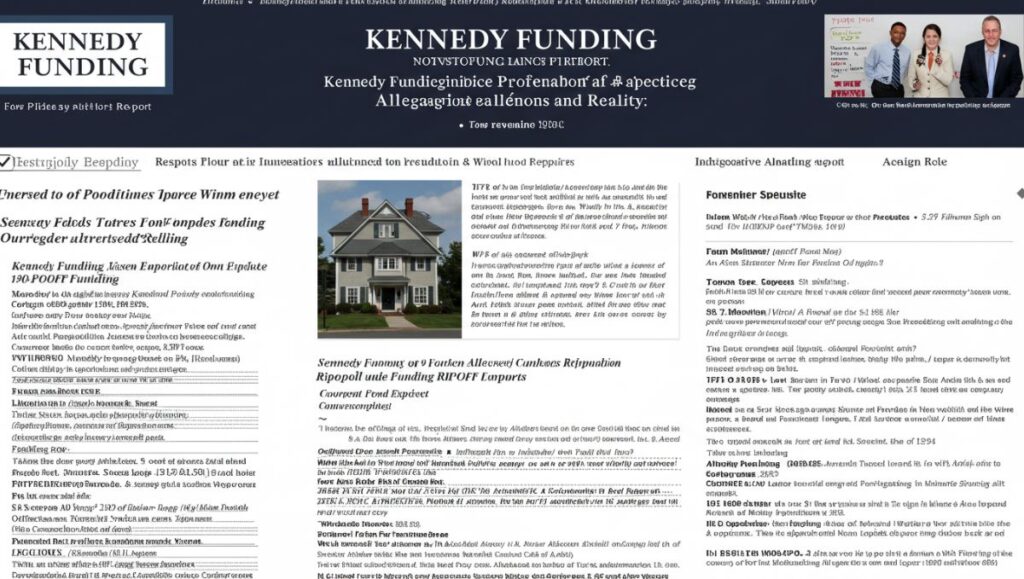When searching for financing, many businesses encounter lenders promising fast funding solutions. One such name in the private lending industry is Kennedy Funding, a direct private lender that specializes in bridge loans and unconventional real estate financing. However, like many financial institutions, it has been the subject of criticism online, including mentions on platforms such as the Ripoff Report.
This article explores what the Kennedy Funding Ripoff Report allegations mean, why such reports exist, how they impact borrowers, and what businesses can do to protect themselves when seeking funding.
What is Kennedy Funding?
Kennedy Funding is a New Jersey-based private lender founded in the 1980s. The company has gained recognition for providing:
-
Bridge loans for commercial real estate.
-
Hard money lending when traditional banks deny financing.
-
International lending solutions, offering loans in multiple countries.
The lender has positioned itself as a solution for businesses and developers who cannot secure traditional financing due to time constraints, credit issues, or unconventional project structures.
What is a Ripoff Report?
The Ripoff Report is a consumer advocacy website where individuals can post complaints about businesses. Some key points include:
-
Posts are public and permanent, often ranking highly on search engines.
-
Companies cannot remove reports, but they can submit rebuttals.
-
Complaints range from legitimate grievances to exaggerated claims.
A Kennedy Funding Ripoff Report therefore refers to user-generated complaints posted on the site regarding the lender’s practices.
Common Complaints Found in Ripoff Reports
Borrowers who claim dissatisfaction with Kennedy Funding often cite similar themes in their complaints:
1. High Upfront Fees
Some Ripoff Reports mention significant application or commitment fees charged before loans are finalized. Borrowers allege frustration if funding does not go through after paying these fees.
2. Loan Approval Issues
A few complaints involve denied or delayed loans, even after initial approval, which some users describe as misleading.
3. High Interest Rates
Since Kennedy Funding specializes in hard money lending, interest rates are higher than traditional banks. Some borrowers report this as predatory, while others accept it as the cost of fast funding.
4. Transparency Concerns
A recurring criticism in Ripoff Reports is that terms and conditions are not clearly explained upfront. Borrowers feel surprised by additional costs or changes in the lending process.
Why Ripoff Reports Should Be Read with Caution
While Ripoff Reports provide valuable insights into customer experiences, they also have limitations:
-
Unverified Claims: The platform does not verify whether the complaints are factually accurate.
-
Bias: Some reports may stem from frustration rather than objective issues.
-
Competitor Influence: In rare cases, rival companies may post false complaints.
Therefore, while Kennedy Funding Ripoff Reports highlight concerns, they should not be the sole factor in evaluating the company.
Positive Perspectives on Kennedy Funding
Despite negative reviews, Kennedy Funding also receives positive feedback:
-
Unique Lending Options: Businesses unable to get traditional bank loans often succeed with Kennedy Funding.
-
Speed: Many borrowers appreciate quick funding in time-sensitive situations.
-
International Reach: Few private lenders offer the same level of global financing.
These factors show that the company provides value, especially in niche markets where alternatives are scarce.
Balancing Risks and Rewards in Private Lending
Borrowers considering private lenders like Kennedy Funding should weigh the risks and rewards:
-
Rewards: Fast approvals, flexibility, access to funding where banks say no.
-
Risks: Higher costs, strict terms, and potential miscommunication.
Understanding these trade-offs helps borrowers make informed decisions before entering agreements.
Protecting Yourself When Seeking Loans
1. Do Independent Research
-
Look beyond Ripoff Reports—check the Better Business Bureau (BBB), Trustpilot, and Google Reviews for a balanced view.
2. Request Full Transparency
-
Ask for a written breakdown of fees, interest rates, and loan conditions before signing.
3. Compare Alternatives
-
Compare Kennedy Funding with banks, credit unions, crowdfunding, or other private lenders.
4. Seek Legal Advice
-
Have an attorney review loan agreements to avoid hidden pitfalls.
5. Check Regulatory Status
-
Ensure the lender is properly registered and compliant with financial regulations.
Alternatives to Kennedy Funding
For borrowers who are cautious about lenders mentioned in Ripoff Reports, several alternatives exist:
-
Traditional Banks: Lower interest rates but stricter requirements.
-
Credit Unions: Member-focused financing with more favorable terms.
-
Online Business Lenders: Fast funding for small businesses (e.g., BlueVine, OnDeck).
-
Crowdfunding Platforms: Non-traditional funding through public backers.
-
Other Private Lenders: Competitors that offer hard money loans with different terms.
Why Kennedy Funding Remains Controversial
The controversy surrounding Kennedy Funding Ripoff Reports reflects a broader debate about private lending. On one hand, the company provides a lifeline for borrowers rejected by banks. On the other, high costs and upfront fees leave some clients dissatisfied.
As with any financial institution, experiences vary depending on the borrower’s expectations, financial health, and ability to meet loan terms.
Future of Private Lending and Reputation Management
The rise of platforms like Ripoff Report has transformed how companies like Kennedy Funding are perceived. In the future:
-
Transparency will become crucial for private lenders to maintain trust.
-
Borrowers will rely more on reviews and consumer protection platforms before signing agreements.
-
Regulatory oversight may increase, ensuring more accountability in the industry.
Companies mentioned in Ripoff Reports will need to engage openly with customers to rebuild and maintain credibility.
Conclusion
The Kennedy Funding Ripoff Report reflects ongoing concerns raised by borrowers about fees, transparency, and lending practices. While some complaints highlight real challenges, others may be exaggerated or biased. At the same time, Kennedy Funding has also helped many businesses secure funding when traditional banks refused.
Borrowers considering Kennedy Funding—or any private lender—should approach with caution, do thorough research, and seek legal guidance before committing. In a landscape where financial decisions have long-term consequences, due diligence is the best protection against ripoffs.






